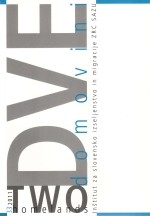Skrite manjšine na Kosovu – »V naši lastni skupnosti se počutimo kot duhovi«
Ključne besede:
skrite manjšine, nacionalizem, komuniciranje, Kosovo, nekdanja JugoslavijaPovzetek
Avtorici v članku predstavljata analizo (samo)reprezentacij majhnih, nesrbskih in nealbanskih manjšin na Kosovu. V poglobljenih intervjujih s predstavniki različnih manjšin na Kosovu (z Romi, Aškali, Egipčani, Bošnjaki, s Hrvati, Gorani in s Turki) razkrivata načine, s katerimi ti izražajo svoje razumevanje življenja na »novem« Kosovu. Njuna ključna ugotovitev je, da manjšinske skupine odprto razkrivajo diskriminacijo in prevladujočo uokvirjanje njihovih skupnosti kot »Drugih« s strani kosovskih Albancev in Srbov, obenem pa želijo ostati »skrite«.
Prenosi
Literatura
Administration and Governance in Kosovo (2005). Prishtina: Institute for Policy and Development.
Alonso, Ana Maria (1994). The Politics of Space, Time and Substance: State Formation, Nationalism, and Ethnicity. Annual Review of Anthropology, 23(3): 379–405.
Andrejevich, Milan (1997). The Sandžak: A Perspective of Serb-Muslim Relations. Muslim Identity and the Balkan State (Ed. Hugh Poulton and Suha Taji-Farough). London: Hurst & Company, 180–193.
Bakic-Hayden, Milica (1995). Nesting Orientalisms: The Case of Former Yugoslavia. Slavic Review, 54(4): 917–931.
Baldwin, Clive (2006). Report: Minority Rights in Kosovo under International Rule. London: Minority Rights Group International.
Cahn, Claud (2007). Birth of a Nation. German Law Journal, 8(1): 81–94.
Blagojevic, Marina (2000). The Migrations of Serbs from Kosovo during the 1970s and 1980s: Trauma and/or Catharsis. The Road to War in Serbia (Ed. Popov, Nebojsa). Budapest: CEU Press.
Conclusions of the EU’s general aff airs and external relations council (2008). http://www.consilium.europa.eu/ueDocs/cms_Data/docs/pressData/en/gena/98818.pdf (12. 12. 2010).
Duijzings, Ger (2000). Religion and the Politics of Identity in Kosovo, London: Hurst & Co.
Eriksen, Thomas Hylland (1993). Ethnicity and Nationalism: Anthropological Perspectives. London: Pluto Press.
Erjavec Karmen and Zala Volcic (2007). ‘War on terrorism’ as a discursive battleground: Serbian recontextualization of G.W. Bush’s discourse. Discourse & Society, 18(1): 123–138.
Graczyk, Donald A. and Symeon A. Giannakos (2006). The Face of Kosovo Albanian Nationalism. Mediterranean Quarterly, 17(4): 142–159.
Greenberg, Robert (2004). Language and Identity in the Balkans. Serbo-Croatian and Its Disintegration. Oxford, New York: Oxford University Press.
Hall, Stuart (1996). Introduction. Who Needs Identity? Questions of Cultural Identity (Ed. Stuart Hall and Paul du Gay). London: Sage, 4–5.
Human Right World Report 2009 (2009). New York: Human Right Watch.
James, Paul (1996). Nation Formation. London: Sage.
Kosovo Constitution. http://www.uni-graz.at/opv1www_constitution_kosovo.pdf (12. 12. 2010).
Lantschner, Emma (2008). Protection of Minority Communities in Kosovo, Review of Central and East European Law, 33(4): 451–190.
Law on Local Self Government (2008). Kosovo Assmbly. http://www.assemly-kosova.org/?cid=2,191,249 (12. 12. 2010).
Markovic, Predrag (2003). Ethnic Stereotypes: Ubiquitous, Local or Migrating Phenomena: The Serbian-Albanian Case. Bonn: Michael Zikic Stiftung.
Minority Rights Group International Report 4. (2004). European Centre for Minority Issues. http://www. ecmi.de/rubrik/57/reports/ (20. 12. 2010).
Mladenovic, Radivoje (2004). Slovenska lingvistička pripadnost, konfesionalna pripadnost i etnički transfer u svetlu skrivenih manjina na jugozapadu Kosova i Metohije. Skrivene manjine na Balkanu (Ed. Biljana Sikimić). Beograd: Balkanološki insitut SANU, 245–258.
Mueller, Stephan (2007). Minority Report. http://www.ombudspersonkosovo.org/index.php?cid=2,93& match=mandate&off set=4 (20. 12. 2010).
Palme, Nataša (2009). Analiza poslovnega okolja Kosova. Ljubljana: EF.
Penrose, Jan (1995). Essential Construction? The ‘Cultural Bases’ of Nationalist Movements. Nations and Nationalism, 1(3): 402–404.
Petrovic, Tanja (2008). Serbs, Albanians, and Those in Between. Dve domovini /Two Homelands, 27(1): 67–81.
Promitzer, Christian (2003). ‘Gute Serbien’: Ethnolohen und Politiker über die Identität der Serben in der slowenischen Bela Krajina. Umstrittene Identitäten (Ed. Ulf Brunnbauer). Bern: Peter Lang, 173–199.
Promitzer, Christian (2004). (Ne-)vidljivost skrivenih manjina na Balkanu. Skrivene manjine na Balkanu (Ed. Biljana Sikimić). Beograd: Balkanološki institut SANU, 11–24.
Ramet, Sabrina (2005). Thinking about Yugoslavia. New York, Cambridge: Cambridge University Press.
Schutt, Russell K. (2001). Investigating the Social World. Thousand Oaks: Pine Forge.
Sharp, Lesley (2003). Laboring for Colony an Nation. Critique of Anthropogy, 23(1): 75–91.
Stevens, Georgina (2009). Report: Filling the Vacuum: Ensuring Protection and Legal Remedies for Minorities in Kosovo. London: Minority Rights Group International.
Sullivan, Daniel P. (2007). Tinder, Spark, Oxygen and Fuel: The Mysterious Rise of the Taliban. Journal of Peace Research, 44(2): 93–108.
The IMG report is factually not accurate (2009). http://hostmonster.com/cgi/suspended?d=kosovotimes. net&r=individual (12. 12. 2010).
Trubeta, Sevasti (2003). Gypsiness, Racial Discourse and Persecution: Balkan Roma during the Second World War. Nationalities Papers, 13(4): 495–514.
UNMIK Regulation on the Promulgation of the Anti-Discrimination Law adopted by the Assembly of Kosovo, UNMIK/REG/2004/32 (2004). http://www.unmikonline.org/regulations/unmikgazette/02english/ E2004regs/E2004regs.htm (12. 12. 2010).
Prenosi
Objavljeno
Kako citirati
Številka
Rubrike
Licenca

To delo je licencirano pod Creative Commons Priznanje avtorstva-Nekomercialno-Brez predelav 4.0 mednarodno licenco.
Avtorji jamčijo, da je delo njihova avtorska stvaritev, da v njem niso kršene avtorske pravice tretjih oseb ali kake druge pravice. V primeru zahtevkov tretjih oseb se avtorji zavezujejo, da bodo varovali interese založnika ter da bodo povrnili morebitno škodo.
Podrobneje v rubriki: Prispevki





